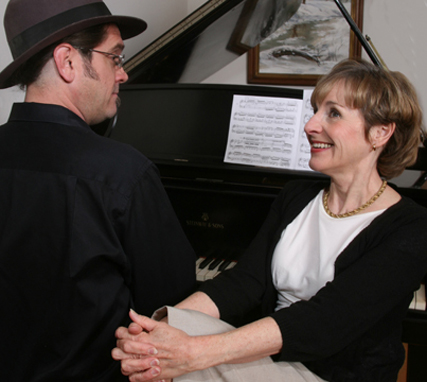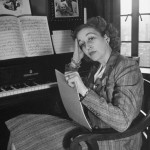By: Alix Cohen
I feel a song coming on… “I wrote that and I don’t believe a word of it…you have to tease it out…it’s hard slave labor…”
Dorothy Fields 1905-1974, librettist and lyricist, wrote over 400 songs for Broadway Musicals and films in an era dominated by men and was the first woman to win an Oscar for songwriting. Born into a theatrical family- her father, Lew, was half the vaudeville team, Weber and Fields. Dorothy entered the profession serendipitously while still in her twenties when asked to “try” lyrics by a composer she knew socially. Her family was against it. Eschewing the use of a thesaurus or rhyming dictionary, this natural talent wrote lyrics you’ve enjoyed all your life.
The utterly charming Pippa White, has configured an entertaining and comprehensive look at Dorothy Fields’ life and oeuvre in a tight ninety minutes. Playing her subject, utilizing mostly Fields’ own words, she relates a history that, more or less, began with 3 songs consigned for The Cotton Club but never performed there. When, much to the attending authors’ chagrin, these were arbitrarily replaced with bawdy numbers, Lew Fields threatened the manager with violence if credit was not publically withdrawn. It was. At 22, and for many years following, Fields’ collaborator was Jimmy McHugh.
Were you aware that Fields and McHugh wrote “I Can’t Give You Anything But Love,” “Exactly Like You,” and “On the Sunny Side of the Street?” (Blackbirds of 1928) Critics called the first, now iconic song “sickly and puerile.” “I think it was the Depression that made that song a hit.” The pair contributed to revue after revue. “The Depression was so hard for so many people but great for me.” Enlarged photos of her family and later, herself, stand at an easel.
White sings as if she was the author, invested in every word, communicating every feeling, selling the material. Her Fields aims to please. If this were a “straight” cabaret act, that of a vocalist celebrating the work, gestures and expressions, it might be interpreted as overt. In context, however, they are exactly right – appealing and character bound. The actress slips back and forth from vocals to narrative fluidly illuminating the former with the latter. With Vince Learned on piano, vocals ably fall into place both musically and dramatically with no specific character introduction necessary.
After 10 years, Fields and McHugh were called to Hollywood. One of her first assignments as a contract writer was the title song for a film called “Cuban Love Song.” She dissects the inadequacies of the song. Additional disclosure of Fields’ thoughts on writing is cleverly communicated during short “interviews” with a reporter. “I’m in the Mood for Love” and “Don’t Blame Me” were written during this period. Duets with Learned are winning. White’s is a character voice, skilled but a little thin. Learned has a full, rich baritone.
At this point, Jerome Kern came into Fields’ life with 16 bars that became “Lovely to Look At” used in Roberta (Fred Astaire/Irene Dunne.) When she asked why there were only 16 bars, he replied, “That’s all I had to say.” A wonderfully rich period writing for Astaire films followed. You likely thought all those songs were Gershwin and Berlin. They were not. Fields’ Oscar was awarded for “The Way You look Tonight” from Swingtime. Critics wrote Jerome Kern “should not try to swing.”
Fields missed New York and Broadway. At 34, she also found romance with a New York buinessman. “Remind Me” not to find you so attractive…aptly reflects her state of mind. She married, had two children and, for some years, wrote only librettos working a great deal with Cole Porter. It was she who came up with the idea for Annie Get Your Gun, which Rodgers and Hammerstein agreed to produce. When Kern unexpectedly died, the producers suggested Irving Berlin as a viable replacement. They warned that Berlin would, of course, write both music and lyrics. And so it came about. Fields authored the libretto.
The last chapter of her life began with the deaths of Field’s beloved brother and husband, the lack of a regular collaborator, and Broadway’s evolution to shows like Hair and Jesus Christ Superstar. Nonetheless, Sweet Charity and Seesaw were yet to come. White deftly uses selected songs to illuminate Fields’ state of mind as well as to present numbers from the shows. A Sweet Charity medley is the only over-long segment we experience. “It’s Not Where You Start It’s Where You Finish” appropriately wraps up the story. A song cut from Seesaw, “Fields couldn’t put this one into another show, because there wasn’t one,” doesn’t relate to her life and seems irrelevant.
I Can’t Give You Anything But Songs is lively and informative. Its libretto is accomplished; performances thoroughly engaging. Minor changes in wardrobe-hats, a scarf, sunglasses, a sweater, are all White needs to shift age, circumstance and geography. Arrangements are well tailored to the piece and its voices. Pacing is adroit.
The piece deserves additional venue.
I Can’t Give You Anything But Songs- The Life and Work of Dorothy Fields
A Cabaret Play Conceived and Created by Pippa White
Pippa White- Dorothy Fields
Composers, Reporters- Vince Learned
Musical Director, Accompanist, Vince Learned
United Solo Festival 2013
Theatre Row 410 West 42 St.
November 21, 2013




















